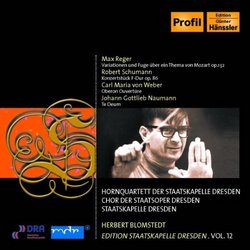Out Of The Ordinary With The Staatskapelle Dresden
Erik North | San Gabriel, CA USA | 11/05/2007
(5 out of 5 stars)
"By any stretch of the imagination, be it the length of its existence or the quality of its players, the Dresden State Orchestra (Staatskapelle Dresden) is one of the world's premier orchestras. With a reputation for first-rate interpretations of Bruckner, Richard Strauss, and many other high German Romantic composers, as well as such men as Sir Colin Davis, Giuseppe Sinopoli, Rudolf Kempe, and Eugen Jochum having led it at various times, its world-class status remains unquestioned.
On this particular Hanssler release, taken from various German radio broadcasts made between 1980 and 1990, Herbert Blomstedt, who was officially the orchestra's music director between 1975 and 1985, leads the four century-old ensemble in four highly unusual works: Max Reger's "Variations And Fugue On A Theme Of Mozart" (based on a theme in Mozart's Piano Sonata in A, K. 331); the challenging "Kozertstuck" for four horns and orchestra by Robert Schumann; the "Oberon" overture of Carl Maria von Weber; and finally, the "Te Deum" of the German composer Johann Gottlieb Naumann.
What makes this recording as interesting as it is is the fact that these works are not exactly the kind that are performed every other day of the week anywhere in the world. The Reger work seems to be at least partly inspired by the much more familiar Haydn Variations of Johannes Brahms; while the Schumann "Konzerstuck" is among the most challenging of all instrumental concertos, not only for the fact of using four French horns, but the fact that the writing for the soloists is unbelievably challenging (for comparison, try recordings made by the Chicago Symphony [under Daniel Barenboim] or the Seattle Symphony [under Gerard Schwarz]). But the Dresden horn section, led by the legendary Peter Damm, pulls it off with considerable aplomb.
Weber's "Oberon" Overture is most likely the one that people would go for with respect to this recording; and the Dresden orchestra and Blomstedt don't disappoint (thanks to their familiarity with this composer's operas). The Naumann "Te Deum" is an extremely unfamiliar piece (possibly receiving its world premiere recording here?), a choral piece that, despite its composer having been alive during the time of Mozart and Haydn, to me has the feel of Bach, Handel, or even Charpentier (whose "Te Deum" setting Naumann's sometimes sounds uncannily like). Blomstedt and the orchestra are joined on this work by the chorus of the Dresden State Opera.
The works on this recording may not be everyone's cup of tea; but for those who are looking to explore works from the past that are not necessarily on the classical "Hit List", this does come well recommended."
The Reger and Schumann Knocked Me Out!
J Scott Morrison | Middlebury VT, USA | 05/13/2007
(5 out of 5 stars)
"Frankly I didn't have terribly high hopes for this release. I vastly admire the artistry of both Herbert Blomstedt and the Dresden Staatskapelle but my experience with the recent stream of releases on the Profil label (run by Günter Hänssler, familiar from his eponymous label) has been highly variable. These releases seem to stem mostly from live concerts, generally broadcast concerts, by German ensembles and some of them have been really bad. (Others, to be fair, have been excellent.) Still, I wanted to hear Blomstedt and this orchestra, and I particularly wanted to hear the Reger because the Dresden orchestra has always had a very strong connection with his music, having played this work with such conductors as Fritz Busch, Karl Böhm, Joseph Keilberth and Franz Konwitschny, all former principal conductors of the Staatskapelle. Also this recording came from a high point in the orchestra's history, a time when they were playing so beautifully as to make angels cry. This performance was recorded on March 13, 1990 at a concert celebrating the 100th birthday of Fritz Busch.
Well, I was simply bowled over both by the beauty of the Staatskapelle's playing and by the subtlety, grace and power of Blomstedt's interpretation. The Mozart Variations is based on the first theme of Mozart's A Major Sonata, K.331 -- the Mozart sonata that Harry Truman delighted in playing on the White House piano for guests (!) -- and can come across as either trivial or clunky, depending on the conductor's conception and the level of the orchestra's artistry. This, not to put too fine a point on it, is the most exalted performance of the work that I've ever heard. I cannot describe how gorgeous the orchestra sounds. Part of that, surely, is the engineering (Günter Neubert) and the hall's ambience (the Semperoper in Dresden), but mostly it is that this is a supremely beautiful performance. Such pianissimi, such supreme blending, such contrapuntal clarity, such gossamer strings, such exalted solo wind passages!
Peter Damm, in his day, was one of the world's great horn players and he was for years the principal horn (1967-2002) of the Staatskapelle. He and his section were renowned among cognoscenti. And here, in a 1981 concert, they get to play the Schumann Konzertstück, the most important four-horn concerted piece ever written. This is a superb performance. The 1990 performance of Weber's Oberon Overture is pretty mainstream and not necessarily a first choice, but then I doubt anyone is buying this CD for the Oberon Overture, or for Johann Gottlieb Naumann's 'Te Deum' which concludes the CD. I had never heard it before. Naumann (1741-1801) had a strong Dresden connection, having been kapellmeister there for many years. Still his Te deum is fourteen minutes of sub-Mozartian choral bombast which I doubt I'll be reaching for again.
For the Reger and the Schumann, this CD is a winner and those two works make this release important.
Scott Morrison
"

